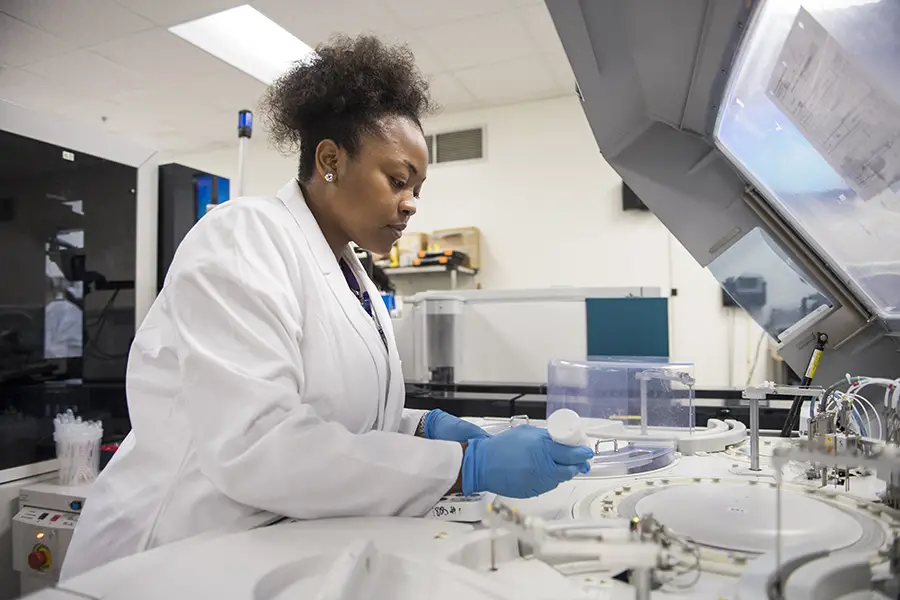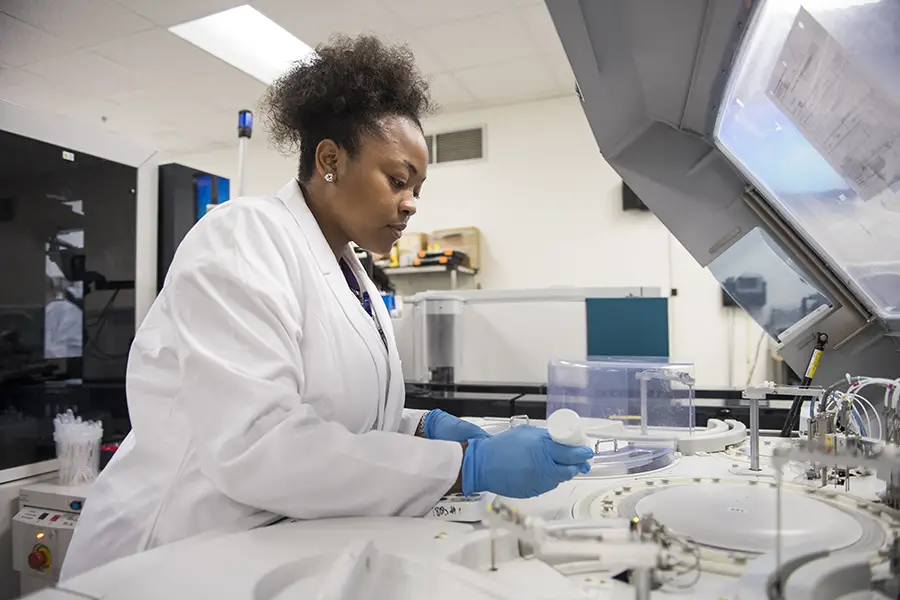Subject Combination for Biomedical Technology is the topic am going to look at in this post, if you have any questions related to admission, subject combination, course, career, and so on, this post will answer it all.
Biomedical Technology is an interdisciplinary field that combines principles of biology, medicine, and engineering to develop, maintain, and improve healthcare outcomes through the application of technology.
The field is focused on developing and implementing innovative solutions to improve patient care, enhance medical diagnosis and treatment, and advance medical research.
Biomedical Technology plays a critical role in modern healthcare, with applications in medical imaging, laboratory technology, medical device development, and many other areas.
In this context, this discussion will explore the Subject Combination, potential career paths, and opportunities available to individuals who obtain a certificate in Biomedical Technology.
What is Biomedical Technology

Biomedical technology refers to the application of engineering and technology principles to the field of medicine and biology.
It involves the design, development, and implementation of various medical devices, equipment, and systems that aid in the diagnosis, treatment, and prevention of diseases and injuries.
Some examples of biomedical technology include:
- Medical imaging equipment, such as MRI and CT scanners, allows doctors to see inside the body to diagnose and monitor conditions.
- Prosthetic limbs and other assistive devices help people with disabilities to live independently.
- Artificial organs and tissue engineering, aim to replace or repair damaged organs and tissues.
- Diagnostic and therapeutic equipment, such as blood glucose monitors and drug delivery systems, help doctors manage chronic diseases.
Biomedical technology is an interdisciplinary field that brings together expertise from a variety of fields, including engineering, biology, physics, and medicine.
It has the potential to revolutionize healthcare and improve patient outcomes.
Admission Requirements for Biomedical Technology
Admission requirements for biomedical technology programs may vary depending on the institution and the specific program.
However, here are some common requirements:
- Educational background: A high school diploma or equivalent is typically required for admission to an undergraduate program in biomedical technology. Some programs may also require the completion of specific high schools courses, such as biology, chemistry, and physics.
- GPA: Most programs require a minimum GPA for admission, typically around 3.0 on a 4.0 scale.
- Standardized test scores: Many undergraduate programs require students to submit scores from standardized tests such as the SAT or ACT.
- Letters of recommendation: Some programs may require letters of recommendation from teachers, employers, or other individuals who can speak to the student’s academic and personal qualifications.
- Personal statement: Many programs require a personal statement or essay in which the student explains why they are interested in studying biomedical technology and what their career goals are.
- Other factors: Some programs may take into account other factors such as extracurricular activities, work experience, and community involvement.
For graduate programs in biomedical technology, admission requirements may include a bachelor’s degree in a related field, such as engineering or biology, a minimum GPA, letters of recommendation, a personal statement, and sometimes standardized test scores such as the GRE.
Additionally, some graduate programs may require relevant work experience or research experience in the field.
JAMB subject combination for Biomedical Technology
The Joint Admissions and Matriculation Board (JAMB) subject combination for Biomedical Technology may vary depending on the institution offering the program. However, here is a typical subject combination:
- English Language: This is a compulsory subject for all candidates.
- Mathematics: Mathematics is also a compulsory subject for Biomedical Technology.
- Physics: Physics is an essential subject for Biomedical Technology as it is involved in the design and analysis of biomedical equipment.
- Chemistry: Chemistry is also an important subject as it is involved in the study of chemical reactions and processes that occur in living organisms.
Candidates who want to pursue a degree in Biomedical Technology should ensure they register for these four subjects during their JAMB registration.
It is also important to check with the specific institution to confirm the required subject combination as it may differ slightly from institution to institution.
SSCE Subject Combination for Biomedical Technology
The SSCE subject combination for Biomedical Technology may vary depending on the institution offering the program. However, here is a typical subject combination:
- English Language: This is a compulsory subject for all candidates.
- Mathematics: Mathematics is also a compulsory subject for Biomedical Technology.
- Physics: Physics is an essential subject for Biomedical Technology as it is involved in the design and analysis of biomedical equipment.
- Chemistry: Chemistry is also an important subject as it is involved in the study of chemical reactions and processes that occur in living organisms.
- Biology: Biology is also required for Biomedical Technology as it provides a foundation for the study of living organisms and their functions.
Candidates who want to pursue a degree in Biomedical Technology should ensure they have credits in these five subjects in their SSCE or equivalent certificate. It is also important to check with the specific institution to confirm the required subject combination as it may differ slightly from institution to institution.
WASSCE/WAEC Subject Combination for Biomedical Technology
The WASSCE/WAEC subject combination for Biomedical Technology may vary depending on the institution offering the program. However, here is a typical subject combination:
- English Language: This is a compulsory subject for all candidates.
- Mathematics: Mathematics is also a compulsory subject for Biomedical Technology.
- Physics: Physics is an essential subject for Biomedical Technology as it is involved in the design and analysis of biomedical equipment.
- Chemistry: Chemistry is also an important subject as it is involved in the study of chemical reactions and processes that occur in living organisms.
- Biology: Biology is also required for Biomedical Technology as it provides a foundation for the study of living organisms and their functions.
Candidates who want to pursue a degree in Biomedical Technology should ensure they have credits in these five subjects in their WASSCE/WAEC or equivalent certificate.
It is also important to check with the specific institution to confirm the required subject combination as it may differ slightly from institution to institution.
NECO Subject Combination for Biomedical Technology
The NECO subject combination for Biomedical Technology may vary depending on the institution offering the program. However, here is a typical subject combination:
- English Language: This is a compulsory subject for all candidates.
- Mathematics: Mathematics is also a compulsory subject for Biomedical Technology.
- Physics: Physics is an essential subject for Biomedical Technology as it is involved in the design and analysis of biomedical equipment.
- Chemistry: Chemistry is also an important subject as it is involved in the study of chemical reactions and processes that occur in living organisms.
- Biology: Biology is also required for Biomedical Technology as it provides a foundation for the study of living organisms and their functions.
Candidates who want to pursue a degree in Biomedical Technology should ensure they have credits in these five subjects in their NECO or equivalent certificate.
It is also important to check with the specific institution to confirm the required subject combination as it may differ slightly from institution to institution.
Direct Entry Admission
To gain admission into a university in Nigeria through Direct Entry, candidates are required to meet the following admission requirements:
- Possess a minimum of two (2) A-Level passes or its equivalent in relevant subjects. Candidates with OND, NCE, HND, or their equivalent with a minimum of upper credit can also apply for Direct Entry.
- Possess a minimum of five (5) O-Level credits, including Mathematics and English Language, and any other relevant subjects related to the course of study.
- Candidates are required to have registered for and obtained the Direct Entry JAMB form, which includes a screening exercise organized by JAMB.
- Candidates must have met the requirements of the specific university and the course they are applying for, such as minimum cut-off marks, subject combination, and other specific requirements for the course.
- Candidates may also be required to submit a transcript of their previous academic records, including their O-Level and A-Level or equivalent results.
It is important to note that the admission requirements for Direct Entry may vary slightly from one university to another, and candidates are advised to check the specific requirements of the university and course they are applying for before applying for admission.
A’Level Admission requirements
To gain admission into a university in Nigeria through A’Level, candidates are required to meet the following admission requirements:
- Possess a minimum of five (5) O-Level credits, including Mathematics and English Language, and any other relevant subjects related to the course of study.
- Obtain a minimum of two (2) A-Level passes or their equivalent in relevant subjects. A’Level courses could be completed in one or two years, depending on the study program.
- Candidates are required to have registered for and obtained the UTME form, which includes a screening exercise organized by JAMB.
- Candidates must have met the requirements of the specific university and the course they are applying for, such as minimum cut-off marks, subject combination, and other specific requirements for the course.
- Candidates may also be required to submit a transcript of their previous academic records, including their O-Level and A-Level or equivalent results.
It is important to note that the admission requirements for A’Level may vary slightly from one university to another, and candidates are advised to check the specific requirements of the university and course they are applying for before applying for admission.
OND Admission requirement
To gain admission into a university in Nigeria through OND, candidates are required to meet the following admission requirements:
- Possess a minimum of five (5) O-Level credits, including Mathematics and English Language, and any other relevant subjects related to the course of study.
- Possess a National Diploma (ND) or its equivalent in a related field from a recognized institution.
- Candidates must have met the requirements of the specific university and the course they are applying for, such as minimum cut-off marks, subject combination, and other specific requirements for the course.
- Candidates are required to have registered for and obtained the Direct Entry JAMB form, which includes a screening exercise organized by JAMB.
- Candidates may also be required to submit a transcript of their previous academic records, including their O-Level and ND or equivalent results.
It is important to note that the admission requirements for OND may vary slightly from one university to another, and candidates are advised to check the specific requirements of the university and course they are applying for before applying for admission.
Why Are these subjects Compulsory?
To study Biomedical Technology at the Federal University of Technology, Owerri (FUTO), the following subjects are required:
English Language: This subject is required as it helps to develop strong communication skills, which are essential for effective communication in the field of biomedical technology.
Mathematics: Mathematics is an essential subject for studying Biomedical Technology. You will need to have a strong foundation in mathematics, including topics like calculus, statistics, and probability, as these are essential for understanding the mathematical principles that underpin many aspects of biomedical technology.
Biology: Biology provides a strong foundation in principles of life sciences, including anatomy, physiology, and genetics, which are relevant to the study of biomedical technology.
Chemistry: Chemistry provides a strong foundation in principles of chemical and physical sciences, including biochemistry, pharmacology, and medical instrumentation, which are relevant to the study of biomedical technology.
It is also recommended to have a good foundation in related subjects such as physics and computer science, as biomedical technology involves understanding the interactions between medical devices, digital imaging, and computer-aided design.
Overall, a strong background in mathematics, biology, chemistry, and related fields is essential for studying Biomedical Technology at any university in Nigeria.
List of schools offering Biomedical Technology

Here are some Nigerian universities that offer Biomedical Technology:
- University of Lagos (UNILAG)
- Federal University of Technology, Owerri (FUTO)
- Madonna University, Elele
- Ladoke Akintola University of Technology (LAUTECH)
- University of Benin (UNIBEN)
- Bayero University, Kano (BUK)
- Abubakar Tafawa Balewa University (ATBU)
- Federal University of Technology, Akure (FUTA)
- Federal University of Technology, Minna (FUTMINNA)
- Bells University of Technology, Ota
Please note that this list is not exhaustive and there may be other universities or colleges in Nigeria offering Biomedical Technology programs.
What can you do with Biomedical Technology Certificate?

With a biomedical engineering certificate, you can work in several fields related to health care, medical research, and the development of biomedical technology.
Here are some possible careers and job opportunities you can pursue with a biomedical engineering certificate:
Biomedical Equipment Technician: You can work as a technician responsible for the installation, maintenance, and repair of medical equipment and devices such as CT scanners, X-ray equipment, and ultrasound equipment.
Medical Laboratory Technologist: You can work in a medical laboratory as a technician responsible for conducting tests and analyzing samples to diagnose diseases and monitor the health of patients.
Medical Research Assistant: You can work as an assistant in a medical research laboratory, responsible for conducting experiments, collecting data, and analyzing results under the supervision of a medical scientist.
Biomedical Sales Representative: You can work for a medical device company as a sales representative responsible for the sales and marketing of medical devices and equipment to healthcare providers and institutions.
Biomedical Engineer: With additional training, you can work as a biomedical engineer responsible for the design and development of medical equipment and devices that improve health outcomes.
Quality Control Technician: You can work as a quality control technician in a medical device manufacturing company, responsible for ensuring that the devices meet the required standards and specifications.
Technical Writer: You can work as a technical writer for a healthcare company, responsible for creating user manuals and other technical documents.
These are just a few of the possible careers you can pursue with a biomedical engineering certificate. Further education, such as a bachelor’s or master’s degree, can expand your career options and increase your earning power.
Conclusion
In summary, biomedical engineering is an important field that focuses on the application of technology to improve health outcomes.
Obtaining a biomedical engineering certificate can open up a variety of career opportunities related to medical equipment and device maintenance, medical laboratory technology, medical research, sales, and design, among others.
It is important to note that further education, such as a bachelor’s or master’s degree, can broaden career opportunities and increase earning potential in the field.
If you find this post helpful, please share it…






